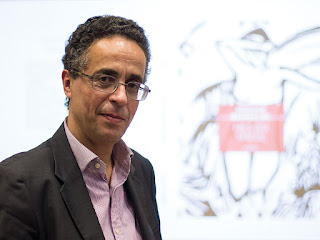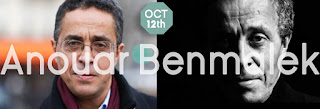J'ai découvert monsieur Anouar Benmalek
 Il
y a quelques jours, je suis allée écouter Anouar Benmalek, un écrivain,
poète et journaliste franco-algérien, lors d’une rencontre littéraire,
une séance de « perco’lecteurs », à la médiathèque des Mureaux.
Il
y a quelques jours, je suis allée écouter Anouar Benmalek, un écrivain,
poète et journaliste franco-algérien, lors d’une rencontre littéraire,
une séance de « perco’lecteurs », à la médiathèque des Mureaux.
Anouar
Benmalek est un ancien professeur de mathématiques devenu poète pour
séduire une femme parlant le sanscrit, car, selon lui, les mathématiques
n’étaient rien moins que séduisantes. En fin de compte, la femme était
mythomane et dénuée de tous les talents admirables qu’elle s’était
inventés et Anouar Benmalek était resté avec sa « mauvaise » poésie sur
les bras (c’est lui qui le dit), avec l’envie d’en écrire davantage et
plein de gratitude, au fond, pour sa muse involontaire. Un grand
écrivain était né. À quoi ça tient ?!
Je
suis confuse. Je n’avais jamais entendu parler de ce monsieur que
pourtant d’aucuns qualifient de « nobélisable », pas plus que je n’avais
lu ses livres, que pourtant la critique louange. Mais on me propose de
rencontrer un écrivain scientifique de formation, il n’en faut pas plus
pour éveiller ma curiosité et, avouons-le tout bas, un soupçon de
jalousie.
Le personnage est modeste et drôle. « À quoi cela sert-il d’écrire ? » demande la bibliothécaire, un brin provocatrice. « À rien ! »
répond-il, non moins provocateur, mais tout de suite il s’explique :
« Ça ne sert à rien d’écrire, mais c’est l’honneur de notre espèce de se
détacher de l’utile », et l’auditoire d’acquiescer admiratif.
Tous
ses livres sont violents malgré lui, car dit-il, la vie est violente.
Il voudrait, il essaie pourtant d’écrire des « love stories ». Il
sourit. Il aimerait pouvoir s’adonner au lyrisme pur. Mais il n’y a rien
à faire, ses histoires prennent place dans l’Histoire, et il est
incapable de s’affranchir du contexte historique dans lequel évoluent
ses personnages. Au point de transformer totalement un roman en cours à
la lecture d’une brève dans le journal…
Mais
il insiste, tentant sans doute de se convaincre, ou de se rassurer
lui-même, il y a toujours une « love story » dans ses histoires (« tout de même menée à rude épreuve ! » souligne l’autre bibliothécaire) ; la « love story » est indispensable pour supporter la violence. Car « certains événements ne sont supportables que si par ailleurs il y a de l’espoir ».
Mais,
s’il n’est pas lyrique, l’homme n’est pas non plus cynique ; il préfère
l’ironie, « seule arme contre la bêtise ». Et se battre, cet homme a dû
et su faire. Décrié, conspué, menacé de mort, le journaliste et
écrivain engagé, admiré sur le sol français, membre fondateur du Comité
algérien contre la torture, a soulevé des vagues insensées de haine
intégriste dans le Moyen-Orient.
N’empêche,
pour toute réaction, il hausse les épaules et mentionne l’extrême
courage de ces gens considérés comme incultes sauvant, au péril de leur
vie, les livres des bibliothèques de Tombouctou ; et il continue
d’écrire coûte que coûte contre la bêtise et pour lui-même.
Parler de son dernier ouvrage transforme sa verve de modeste courageux en confidences timides ; il rougit, presque mal à l’aise.
C’est
une lettre à sa mère, chargée du regret de ce qu’il n’a pas dit à
temps, une revanche aussi pour elle, qui a traversé cette Histoire qu’il
raconte et qui l’a bien maltraitée, sa mère.
La
violence du cœur des hommes m’est insupportable à admettre, même dans
les livres, et d’autant moins lorsqu’elle n’est pas le seul fruit de
l’imagination d’un auteur tourmenté. Par conséquent, monsieur Benmalek,
il n’est point sûr que je m’aventure un jour dans vos « love stories ».
Mais ce livre-là, Tu ne mourras plus demain, je le lirai. Parce
qu’à moi aussi ma chère maman me manque et que lire le manque des autres
est une façon de combler le sien, de manque, le mien à tout le moins.
Une
heure et trente minutes ont passé, déjà. C’était passionnant et
enrichissant. Merci les perco’lecteurs, merci Monsieur Anouar Benmalek.



